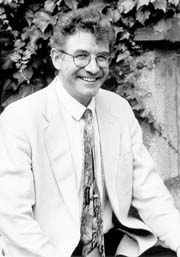
| ||
 | ||
 Professor Robin Yates |
Dynamic scholar wanted
|
DANIEL McCABE | Robin Yates, chair of the Department of East Asian Studies, has his hands full, but he's not complaining. His current priority is a happy one -- and a somewhat rare one in budget-starved Quebec universities.
Yates has been interviewing some of the best and brightest Chinese cultural studies experts in the business with an eye towards offering one of them a senior position in his department. The new professor should be on staff by September and will be one of the key elements in an ongoing effort to strengthen the department. The new position, an endowed chair in Chinese cultural studies, was made possible thanks to a $1.5 million gift from the Drs. Richard Charles and Esther Yewpick Lee Foundation, a Hong Kong charitable organization with a strong interest in education. "We're looking for a young, dynamic scholar who's really going to excite students and be a draw for McGill University," says Yates. "McGill hasn't been as strong in East Asian studies as it should have been," relates Yates, who was recruited to the University from Dartmouth College in 1993 for the express purpose of beefing up his department. But then the budget crunch facing Quebec's universities became crunchier and McGill lost some key East Asian studies scholars to other universities. Yates had to contend with taking a step backward before his department could take two steps forward. The situation today looks brighter. "It's the only department in this faculty that has grown in these last lean years," says Dean of Arts Carman Miller. "I really want to give East Asian studies greater visibility in the faculty and in our programs." Apart from the pending appointment in Chinese cultural studies, there will also be a new faculty member soon to be brought on board as a Japanese literature specialist. The department is working with similar departments at Université de Montréal, Université du Québec à Montréal and Université Laval to establish joint MA and PhD programs. McGill's department already offers students ad-hoc graduate degrees, but wants to be in a position to have these degrees on more stable footing. One problem area that remains to be addressed is the department's library holdings. Yates says that a review done by an outside expert a few years ago revealed that McGill lags behind some of the other top East Asian studies departments in North America. This is being dealt with, in part, by a collaborative agreement with Université de Montréal, whereby the two schools will pool their resources for big ticket items. Yates describes his department as a home to nimble scholars who each specialize in more than one area of research. "All of us have interests that cover a range of different disciplines." Yates himself is a perfect example. His own interests include the life of China's first emperor, Chinese technology, the Great Wall of China, Chinese poetry and Chinese military history. "The department is well-known and respected in East Asia," says Arthur Lau, a Hong Kong-born architect and a member of McGill's board of governors. Together with East Asian studies professor Kenneth Dean and staff from the Development and Alumni Relations Office, Lau wrote the official proposal that solicited the gift for the endowed chair from the Lee Foundation. Vivienne Poy is a member of the Lee Foundation's advisory board. The organization is named after her late parents. She says that the foundation has generally restricted itself to supporting young scholars from China who wanted to study abroad. "This marks a change in our direction," Poy says of the decision to bolster a Canadian-based department. "There is a great need for people in the West to learn more about Asian culture. We have as much to offer the West as the West has to offer us." She'll find no argument from Yates. "Whether or not the next century is a 'Pacific Century,' there's no doubt in my mind that it will become increasingly important for educated people to know more about East Asia." From the zooming popularity of Chinese traditional medicine to the growing influence of East Asian film directors such as Ang Lee, John Woo and Gong Li, East Asian culture has established a permanent foothold in North America. "These are cultures with ancient histories," says Yates. "They have a different philosophy of life and a different way of looking at the world than we do." As business dealings become more international, Yates says it will be essential to know something about East Asian culture. "You can't just go into Japan or China and expect to get a deal done in a day, for instance. You have to take the time to build personal relationships." "Our programs have been fairly Eurocentric in the past," says Miller. "This is one area on the globe that hasn't been given its due." Miller says that arts students are attracted to the department's courses. "There is a demand from students. It shows itself most conspicuously in the great demand among students for Chinese language courses, a demand that we're not always able to satisfy right now." Yates has high expectations for the scholar who will fill the chair in Chinese cultural studies. "We're looking for an excellent undergraduate teacher, someone who can teach an introductory course as well as theory and methodology. We also want someone who can work well with graduate students. This person really will be crucial for our department." It sounds like a tall order, but Yates is confident he'll find the professor he's looking for. "The finalists are all well-known, published scholars. They're all quite talented and they're attracted to the strong research and interdisciplinary traditions of this department."
|
|
| |||||